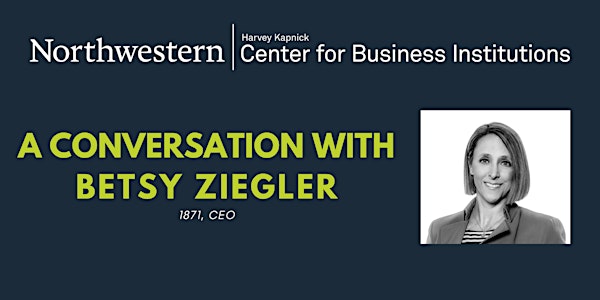
A Conversation with Betsy Ziegler
Date and time
Location
Farmhouse Evanston
703 Church Street Evanston, IL 60201Description
Please join the Kapnick Center for dinner, drinks and conversation with Betsy Ziegler, the first female CEO of 1871, the Number 1 ranked tech incubator in the world.
Previous to 1871, Betsy was the Chief Innovation Officer at the Kellogg School of Management, Northwestern University, responsible for portfolio innovation as well as integrating technology into the Kellogg educational experience. From 2011 through September 2015, she served as associate dean of degree programs and dean of students.
Prior to Kellogg, she served as a principal in McKinsey & Company’s Chicago office where she led the firm’s Life Insurance Operations and Technology practice and co-led its Financial Institutions Operations and Technology practice.
Ziegler holds an M.B.A. from Harvard Business School and received a B.A. in economics from The Ohio State University, where she graduated with distinction. She is also is a member of Ann & Robert H. Lurie Children’s Hospital of Chicago Board of Directors and an advisor and investor in many young technology companies.
FAQs
Who can attend this event?
This event is open to all Northwestern University undergraduate students.
Do I have to bring my printed ticket to the event?
No, we will have electronic check-in.
Organized by
The Minor in Business Institutions offered by the Harvey Kapnick Center for Business Institutions is designed to provide Northwestern undergraduates with a rigorous introduction to business and management fundamentals. The minor is open to all Northwestern undergraduates regardless of major or home school. The minor allows them to build on the set of skills and knowledge they have acquired through other Northwestern coursework to prepare for employment in the business world. It also allows students to connect their study of business and management fundamentals to broader areas of academic inquiry both by linking the study of principles of business and management to the social science scholarship that these principles are based on and by introducing students to social science and humanities scholarship on the cultural, political, philosophical, literary and social aspects of business institutions. Therefore, the minor is not meant to serve as narrowly conceived pre-professional training. Instead the minor offers a broad multi-disciplinary perspective on a significant area of inquiry in 21st century society. Students without extensive quantitative training are particularly encouraged to apply. The minor is designed so that such students can acquire the necessary quantitative background by completing four basic prerequisite courses in mathematics, statistics and economics.